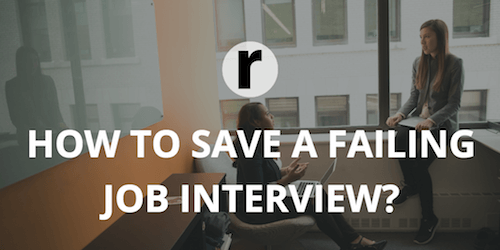
"Can I still save a failing interview?" The answer is YES, but only if you try to fix the situation as quickly as you begin to notice that something is wrong during the course of the interview. Resumance is here to share 7 useful tips to help you get out of a difficult situation during a job interview.
So how will you be able to understand that you're well on your way to an unsuccessful interview? If you speak incoherently, appear anxious, cannot answer questions properly, or present your professional skills unconvincingly, then sure enough you'll know where the situation will go. The recruiter may also appear bored and distracted, or will keep interrupting your presentation and start asking off-topic questions.
But don't panic just yet. At this point, you need to remember a few things: A feeling of excitement prior to the interview is a good sign. It means that you're looking forward to what's about to happen. All you have to do to leave the impression of a competent candidate, is to remain calm and collected. So don't give up! If you have your heart and mind set on the job, gather your thoughts and act at once.
Be honest
If the interview is anything but exciting, be honest and tell the employer that you're feeling nervous. And then, explain why. You can begin by saying, "I like your company so much, which is why…" or "I always worry about the interview" or "I rarely get called in for interviews, so…", or anything similar. A seasoned recruiter will help relieve the tension, change the tone to a friendlier one, and may even offer you a glass of water.
Smile
A smile can go a long way. Firstly, smiling relaxes the body and puts you - and others - in a positive mood. When you smile, the interviewer may smile in return or soften his expression, which eases the tension and the atmosphere during the interview process.
Ask for water
If you feel that you're sweating, palpitating (out of nervousness or anxiety), or your lips are so parched that it's hard to talk, don't hesitate to ask for water. You can excuse yourself and ask for a glass. It won't hurt. It's quite a natural request and the employer will surely respond accordingly. This short break will also give you time to recompose and calm yourself.
Once you get a glass of water, take a few sips to re-hydrate yourself, relax, and take the situation under control again.
Ask questions
During the interview, we're often bombarded with questions that it becomes difficult to think quickly and come up with decent answers. If this ever happens to you, give yourself a break by shooting back a question at the interviewer. While they're answering your question, you can relax and tune yourself back to the right direction.
But what questions should you ask the interviewer? Anything, really, as long as it's still connected to the topic at hand. For example, you may ask, "In order for me to focus on important aspects of the job, what are the most significant tasks I need to do?"
Make sure to ask an open-ended question that would warrant more thought, not just one that can be answered by a simple "yes" or "no".
Clarify how the interview is going
If you notice that the recruiter is somewhat bored, agitated, or appears unsatisfied with your answers, ask them how the interview is going. For example, you can ask them whether or not you're doing it correctly, or if you need to shift your focus on something else.
Make a compliment
If you like the work environment, or the company's products or services, make sure to tell the potential employer about it. It's best to tell them about it at the very beginning of the interview, right when you just met with and about to introduce yourself to the interviewer.
Tell an interesting story
People love to listen to amusing stories. If you were asked a question that suggests a long and storied answer, grab the opportunity and start with the word, "Well, let me tell you a story…"
Remember that there must be exposition, action, and resolution to your story. Don't hesitate to add a bit of humor too, if appropriate.
If you still feel that the efforts you've made still didn't make the situation any better and that the interview is inevitably unsuccessful, don't throw in the white flag just yet. Resumance advises calling the employer or writing a letter. Thank them for their time. Note that although you've made mistakes during the interview, you're a good employee and can be useful to the company. Be friendly and ask for feedback.
Posted by Abigail Jackson
Abigail Jackson is the Editor-in-Chief at Resumance. After earning her degree in Psychology and working for several years as a career adviser, she is now working as an independent career consultant and a seasoned resume writer. You can get in touch with Abigail on Twitter @theresumance.


Comments